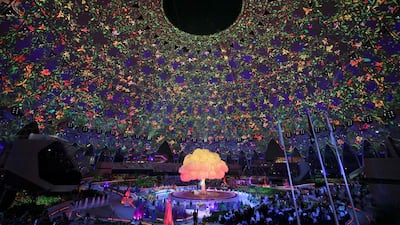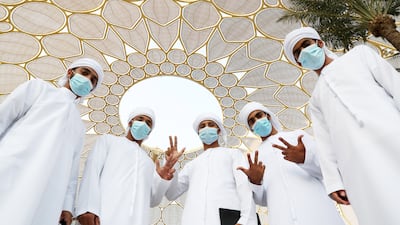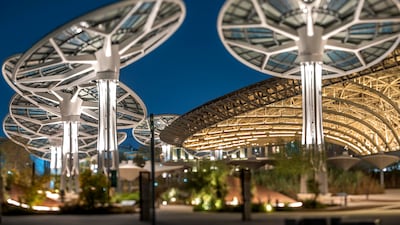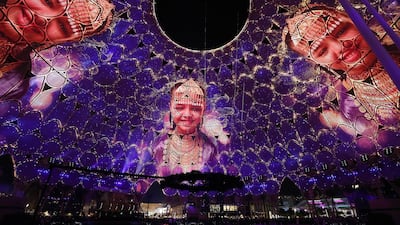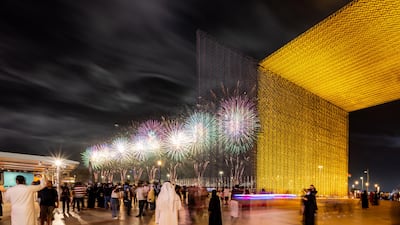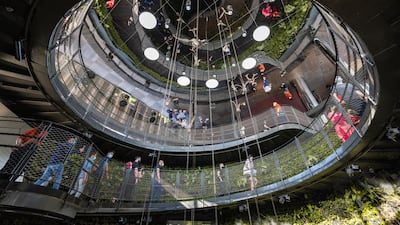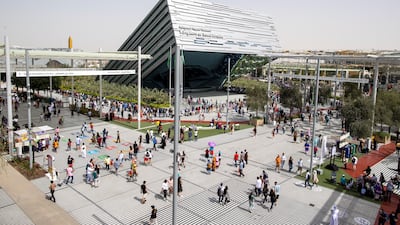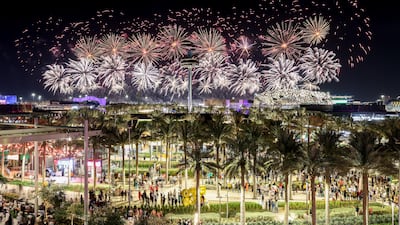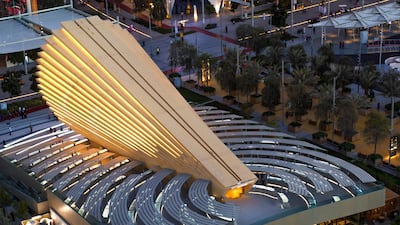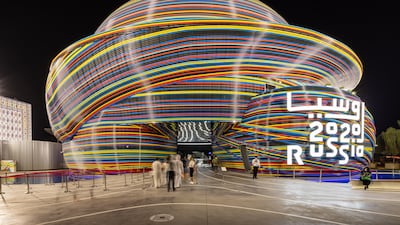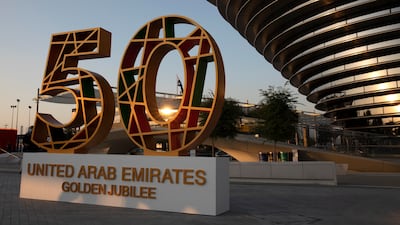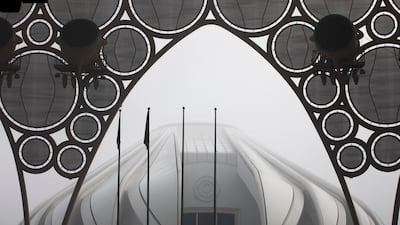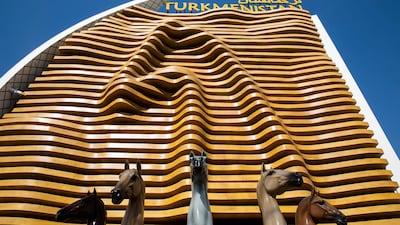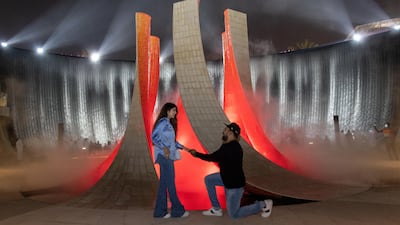Expo 2020 has accelerated recovery of the UAE's tourism, aviation and hospitality sectors from the pandemic, helped by the country's effective management of Covid-19 and by easing travel restrictions globally.
Leisure and business travel, hotel occupancy rates, room revenue and footfall at shopping malls improved because of the influx of tourists drawn to the six-month mega event ending March 31, analysts said.
Emirates, Dubai's home airline, recorded healthy seat load factors and strong travel demand to the emirate across its network during Expo, Sheikh Ahmed bin Saeed Al Maktoum, Emirates group chairman and chief executive, told The National.
"This is due to a combination of factors, including the UAE’s successful management of Covid-19, which was critical to many countries quickly easing travel restrictions to and from Dubai and building traveller confidence," he said. "Interestingly, Emirates has noted an increase in first-time visitors to Dubai among our customers during the past months, which shows the pull of Expo 2020 and strong traveller interest in Dubai."
Dubai International Airport, the world's busiest international airport and Emirates' base, recorded in 2021 its busiest fourth quarter since the pandemic, with Expo being one of the key contributors to passenger traffic of 11.8 million.
Emirates group chairman and chief executive
"It highlighted the UAE’s and Dubai’s exemplary handling of the pandemic while underscoring Dubai’s emergence as a global destination of choice for hosting major international events," said Paul Griffiths, chief executive of operator Dubai Airports. "The event contributed greatly to the overall social and economic recovery within and outside the UAE and benefited the local tourism, hospitality and travel sectors, helping them consolidate their growth."
Expo 2020, one of the world's biggest in-person events since the pandemic, is nearing 21 million visits, with organisers expecting visit numbers to surge further in the final days of the event, inching towards a pre-pandemic target of 25 million. About 30 per cent of the total Expo visitor numbers have been from overseas.
During the week ending March 12, the UAE hotel occupancy rate of 85 per cent was the highest in the world, as it has been over the past four weeks, compared with a global rate of 50.8 per cent, according to the latest report from hospitality analytics provider STR.
'Remarkable' tourism rebound
"The impact of Expo 2020 can be felt reverberating throughout the city – not just in the remarkable tourism rebound – but also in generating numerous business and investment opportunities," Issam Kazim, chief executive of Dubai Corporation for Tourism & Commerce Marketing (DTCM), told The National. "Since Expo 2020 opened on October 1, 2021, Dubai has witnessed a boost in business and leisure tourism, contributing to the exceptional tourism performance the city experienced during the 12 months of 2021."
International visitors to the emirate passed 3.4 million in the fourth quarter of 2021, when Expo was in full swing, representing 74 per cent of the total pre-pandemic tourist arrivals in the same period in 2019. Dubai hosted 7.28 million international overnight visitors between January and December 2021.
"As the first global mega event open to the public since the onset of the pandemic, Expo 2020 established a new precedent for World Expos," Mr Kazim said. The event built an important legacy for the UAE and the Middle East, North Africa, and South Asia region, he said.
Dubai, the Middle East's travel, trade and finance hub known for its glitzy hotels, sprawling shopping malls and swanky restaurants, relied on the tourism industry for 11.6 per cent of its GDP in 2019.
Hotels record higher and consistent demand
The $7 billion world fair kept UAE hotels busy from October to March.
Abu Dhabi-based hotel operator Rotana recorded substantial growth in RevPar during these six months across the UAE, exceeding pre-pandemic levels, Guy Hutchinson, president and chief executive of Rotana, told The National.
"Expo came at a perfect time to reaffirm Dubai’s position as a safe, Covid-protected and well-managed travel destination, and ignited global and regional demand for the UAE when pent-up travel demand was at a peak," he said.
Dubai hotels' performance metrics have "consistently remained high" from October to date, recording strong demand and a "noticeable rise" in average daily rates, said Kostas Nikolaidis, STR’s account executive for Middle East and Africa.
While demand in most big cities fluctuates during the week as the business and leisure mix changes, Expo 2020 provided elevated and consistent demand throughout the entire week since the world trade fair started, he said.
"That has been hard to achieve pre-Expo and even pre-Covid during the best of times," Mr Nikolaidis said.
Dubai hotels' performance exceeded expectations, particularly during the first and final months of the event, with average daily room rates nearing Dh1,000 in October, he said.
"Expo 2020 will always be a case study of an event and a destination that delivered on point – and all that during a global pandemic too," Mr Nikolaidis said.
The 131,745 hotel rooms sold on February 24 is a record high for Dubai, underscoring the magnitude of the event, and could yet be broken again in the days until March-end, according to STR.
"Being able to sell all these rooms and reach high occupancies with expanded room inventory is a big achievement," Mr Nikolaidis said. Since 2019, about 16,487 additional rooms came to market with several new hotel openings.
Hosting Expo has provided a "vital boost" for the tourism and aviation sectors, building on the recovery supported by strong management of the pandemic and global easing of travel restrictions, said Monica Malik, chief economist at Abu Dhabi Commercial Bank.
"The tourism, hospitality and aviation sectors saw robust activity in early 2022 with the further easing of international restrictions and strong pent-up demand," she said. "However, global challenges have increased, which is likely to provide headwinds for these areas."
Post-Expo forecast
The boost from Expo 2020 is setting the tone for an optimistic outlook for the rest of the year as the tourism, aviation and hospitality industries seek to build on that momentum, officials, analysts and executives said.
The effects of Covid-19 are easing after a sharp resurgence late last year when the Omicron variant spread globally, but the Russia-Ukraine war may pose challenges for tourism, said Shady Elborno, head of macro strategy at Emirates NBD.
"Geopolitical tensions in Eastern Europe may cause some headwinds to tourist arrivals from that region, [but] given the fluidity of the situation it will be difficult to ascertain the exact impact," he said. "Given Dubai remains geographically isolated from the tensions, the wider trends of global travel recovery are likely to drive growth in tourism from other markets."
After a growth spike during Expo, the hospitality sector in the next few months is forecast to consolidate during Ramadan in April and the traditionally slower summer months, operating near pre-pandemic levels before picking up again in the fourth quarter, Mr Nikolaidis said.
The Fifa World Cup in Qatar in November will boost demand to Doha, but also for the key transit hubs of Dubai and Abu Dhabi, Mr Hutchinson said.
"We've seen our hotels thrive and we remain very optimistic that growth rates will stay strong throughout the year as the UAE continues to lead global recovery in the hospitality industry," he said.
Dubai hotels are forecast to be the busiest in the region this year, with occupancy rates as high as 74 per cent in areas such as Dubai Creek and Festival City, according to Colliers.
The UAE expects more hotel supply to meet future demand, said Helal Al Marri, director general of the Dubai Department of Economy and Tourism. He did not provide forecast figures.
"We see our big challenge is going to be 'can we build enough hotels?' The forecast for demand requires us to do a significant increase in the number of hotels in the UAE. We're going to see a lot in that area," Mr Al Marri said.
For Dubai International Airport, the slower travel month of Ramadan and the closure of the northern runway for upgrades for 45 days starting on May 9, will affect the second quarter of 2022, Mr Griffiths said.
"The outlook for the second quarter, however, remains optimistic thanks to the pent-up demand as well as the return of normal operations in key markets such as India and further easing of travel regulations around the world," he said.
In 2022, Dubai will "build on the impetus provided by Expo 2020 to further accelerate momentum and deliver sustainable economic growth", Mr Kazim said.











